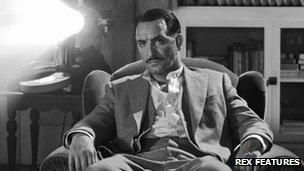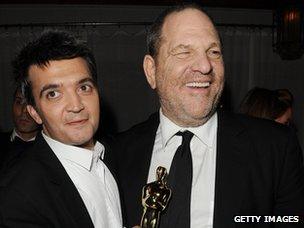What the French really think about The Artist
- Published

Who could resist such a pair? Cinemagoers back in France, it would seem
One of the curious things about The Artist - which with its five Oscars and a host of other awards is now the most decorated piece of cinema in French history - is that in France itself the film has not been a massive success.
When it was released in the autumn, there was already some buzz because Jean Dujardin had taken the best actor title at the Cannes festival in May. But still the film had only a moderately decent run, and certainly didn't figure in the top 10 films - judged by audience - of 2011.
Indeed, so lacklustre was the national reaction, that when The Artist started making serious waves around the world in January this year, they re-released it in France (just three months after the first release) in the hope of surfing the sudden popularity.
Again, the reaction was hardly euphoric.
Raised profile
And still today - despite its Oscars and its Golden Globes, its Baftas and its Cesars - only three million French people have been to see The Artist. Compare that to the 19 million who have been to see the real French movie hit of last year, the comedy Les Intouchables.
So when people say that The Artist shows the depth and originality of French cinema - how it may even come to symbolise a new golden age of French cinema - caution is advised.
According to Antoine de Clermont-Tonnerre, president of UniFrance which promotes French films abroad, the success of The Artist will "certainly have repercussions for the French industry - simply because it raises our profile.
"Foreign buyers can see that every year in France films of quality are being made in all the different genres: comedy, drama, action and animation."
But even he agrees that The Artist has to be seen as something of an exception.
For a start, there is the obvious fact that by virtue of being silent The Artist at one fell swoop overcomes the biggest single hurdle to selling French films abroad; they are in French.
Second, The Artist is about as un-French a film as a French film can be. It is set in Hollywood, made in Hollywood, and a tribute to Hollywood. Asked who his inspirations were, director Michel Hazanavicius gave three names: "Billy Wilder, Billy Wilder and Billy Wilder."
And third, there are arguments over how far The Artist can really be regarded as a product of the French cinema system.
'No help from France'
Most French films enjoy lavish state aid, handed out via the National Centre for French Cinema (CNC) which distributes some 250m euros every year.
Financed via a tax on ticket sales and levies on television companies, these subsidies arguably make French cinema what it is: prolific, capable of occasional brilliance - but above all, simply there. Where other countries have a few pet producers, France at least has a genuine industry.
But Thomas Langmann - who produced and part-financed The Artist - has famously said the film cannot be called entirely French because "we got no help from France".

The Artist was helped by canny marketing, which included canine star Uggie
What angered Mr Langmann was that the CNC refused to fund the film via one of its principal systems of subsidy, known as an "advance on receipts".
This system, which is worth on average 400,000 euros each for 50 or so French films a year, is intended to promote original French films outside the mainstream - criteria which a silent black-and-white film starring a Frenchman might reasonably be construed as fulfilling.
However according to Mr Langmann, the CNC turned down The Artist because they thought it was too "bling-bling". And he castigated the deciding committee as a "group of buddies handing out money to their friends."
His point is the best cinema is made when talented individuals bring together the right combination of passion, daring, originality and hard work.
Pure French product
But he is wrong to imply that The Artist was made in spite of the French system.
In fact more than a third of its 11.3m euro budget came from the French television channels Canal Plus and France 3 (which are obliged by their licences to pump money into film).
And more than 2m euros came in the CNC's so-called 'automatic aid' - which is based on the takings of the makers' previous films.

Was The Artist's American setting a turn off for the French audience?
As the Les Echos financial daily put it, The Artist is in fact a pure French product.
Still, that doesn't detract from the fact that the film has received greater acclaim abroad than it ever did at home, partly because it appeals so much to an American audience.
The story - fame, heartbreak, resurrection - is one of the great American myths, as well as its silent film-era US setting.
But another reason for The Artist's success in the United States is the extraordinarily effective marketing operation conducted by Harvey Weinstein, whose TWC company bought the rights at Cannes.
One-off success?
Weinstein coached Dujardin, co-star Berenice Bejo, Mr Langmann and Hazanavicius through weeks of interviews on the US circuit, putting the focus as much on the story behind the film as on the film itself, and making Oscar success appear inevitable.
Weinstein was in France last month, receiving the Legion d'Honneur from a grateful President Sarkozy.
The Hollywood mogul appears to be in love with French film at the moment, claiming in one interview that "today your films are having the same impact in the world as in the New Wave. It's a new golden age."

Will Harvey Weinsten (right) be all smiles after The Intouchables is released?
But it is how his next French venture fares which may be more telling; in May Les Intouchables gets its American release.
The film is about a wealthy quadraplegic who is looked after by a lovable black kid from the banlieues (French housing estates). It has become one of the most popular films ever in France - as well as in continental Europe - but the omens across the pond are poor.
Several US reviewers have described the film as condescending and even racist. Variety said it was "offensive" and "cringe-worthy" and that the black character (played by Omar Sy) was barely changed from the "jolly house slave of yore".
Weinstein has laughed off these criticisms as misunderstandings, but he may be rattled.
He's about to discover the joys of promoting a real French film.